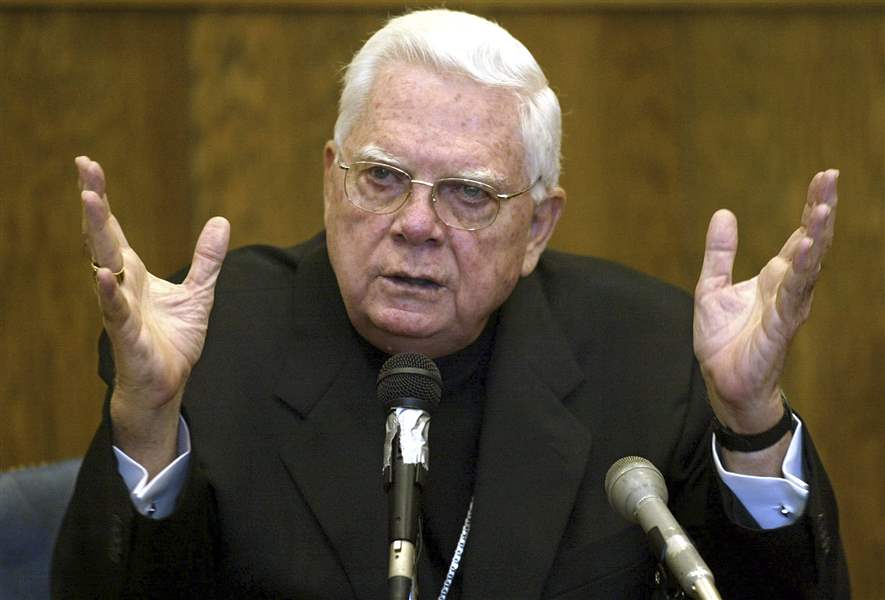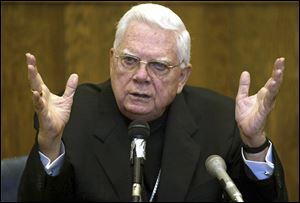
COMMENTARY
Cardinal Law at the gates
12/26/2017

Bernard Law, who came to symbolize the inability of the Catholic church to deal honestly with sexual abuse of children by Catholic priests, died last week at 86.
ASSOCIATED PRESS

Keith Burris.
Bernard Law, who came to symbolize the inability of the Catholic church to deal honestly with sexual abuse of children by Catholic priests, died last week at 86.
VIDEO: Bernard Law faces a reckoning
No human being should be only a symbol in the eyes of fellow human beings. But there is a reason Cardinal Law became a symbol. He, as the archbishop of Boston, enabled the abusers — serially transferring them instead of urging them into treatment and defrocking them. He also directed a systematic stonewalling by the archdiocese when the Boston Globe began to uncover the extent of clergy abuse in Massachusetts. And though he “apologized,” in a very broad and general way, several times, he never set out to make it right.
By that I mean two things: The cardinal never took personal responsibility. And he never ministered to the victims of abuse.
The cardinal eventually recognized the gravity of the scandal — he resigned, after all. But he did not seem to recognize, or accept, the gravity of the sin. He did not see the size, or the blackness, of the stain upon the church. He did not really comprehend the pain the abuses caused — the wrecked lives. Lives forever marred by guilt, pain, addiction, and in many cases suicide. Souls that never healed.
He never saw the human carnage. Never wanted to. And thus, he never did penance.
I watched a video, thanks to the miracle of YouTube, of Cardinal Law speaking publicly for the first time about the abuse, in 2002, under intense pressure from the Globe’s stories. Was he pained by the abuse? Yes. Was he equally irritated at having to meet the press? Definitely.
When the Globe’s Walter Robinson asked the cardinal if he would now see to it that all documents on known priest-pedophiles be made public, the cardinal dodged but essentially declined. He said he didn’t really understand the problem in 1986 and now he understood it better. Poor policy decisions had been made. He felt no great guilt. He gave the impression of a sovereign who wanted his cold porridge to be taken away.
As archbishop of Boston, Cardinal Law moved then Father John Geoghan, for example, from parish to parish, despite full knowledge of his abuse of young boys. Geoghan was convicted in 2002 of indecent assault and battery on a 10-year-old boy. It is said that Geoghan abused 130 boys. How do you aid and abet that?
The Globe uncovered more than 250 cases of priests accused of molestation. Most were either kept on, in new and different parishes, or sidelined and still paid. The diocese turned none of them over to police and prosecutors. How do you let that happen and feel no shame?
Cardinal Law never got it.
And neither did the church. After the cardinal resigned, Pope John Paul moved Law to Italy to serve as archpriest of the Basilica of St. Mary Major — a plumb position. And, after his death, the cardinal was given a funeral at St. Peter’s, complete with a benediction at the end by Pope Francis.
That’s what cardinals get when they die in Rome, said a Vatican spokesman. An abuse victim in Boston asked plaintively: Why couldn’t he have just disappeared?
Cardinal Law’s last post may have been an exile, but it was a sumptuous one, more closely resembling a reward than a punishment. He was still in the club, which makes you wonder what it takes to get thrown out of the club.
The tragedy of Cardinal Law is not that he went from liberal young priest advocating for civil rights and the plight of the poor to tone deaf prince of the church. Power corrupts and no one with power has clean hands, ever. The tragedy is that Cardinal Law never showed shame or remorse.

Bernard Law, who came to symbolize the inability of the Catholic church to deal honestly with sexual abuse of children by Catholic priests, died last week at 86.
The tragedy for the Catholic Church is that Law was given a comfortable, indeed prestigious sinecure. Pope John Paul said, in effect, he’s still my guy. And Boston clerics often said, aloud “he got a raw deal.”
No, the victims of pedophiles got the raw deal.
Cardinal Law was more than “tone deaf.” He was Teflon. He paid nothing. There was no reckoning.
“Where is the repentance of the Church for these horrors,” asked a devout Catholic friend of mine trying to hang on to her church. “Where is the remorse and the mortification?”
She believes that divine forgiveness must surely come. But first there must be a confession of sin and penance done.
Law never faced criminal sanctions. He did not go to live in the desert as a hermit. He did not open and man a soup kitchen in Boston. He did not wear a hair shirt by night and move rocks and make bread by day in some monastery. He did not become a missionary, doing good and living in a hut in Africa or Latin America. He did not become a chaplain to the sexually abused.
He lived his last years in palatial quarters, no doubt with a driver and a chef, and sat upon a throne on a high alter in robes of silk and crimson — a good place to utter the phrase “mistakes were made,” rather than mea culpa, mea culpa, mea maxima culpa.
And now the cardinal stands at the gates, as we all will one day. Unlike that day in Boston in 2002, he can no longer dodge the questions. The reckoning has come at last.
Keith C. Burris is a columnist for The Blade. Contact him at kburris@theblade.com or 419-724-6266.